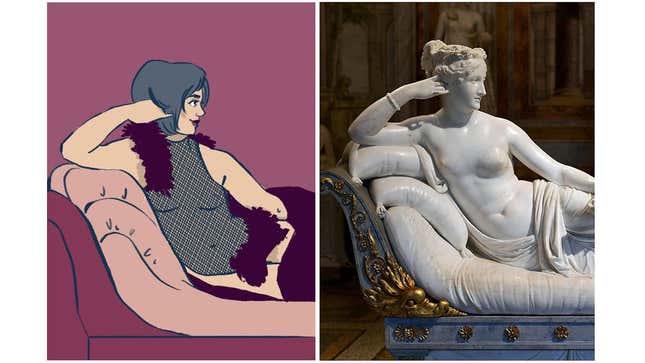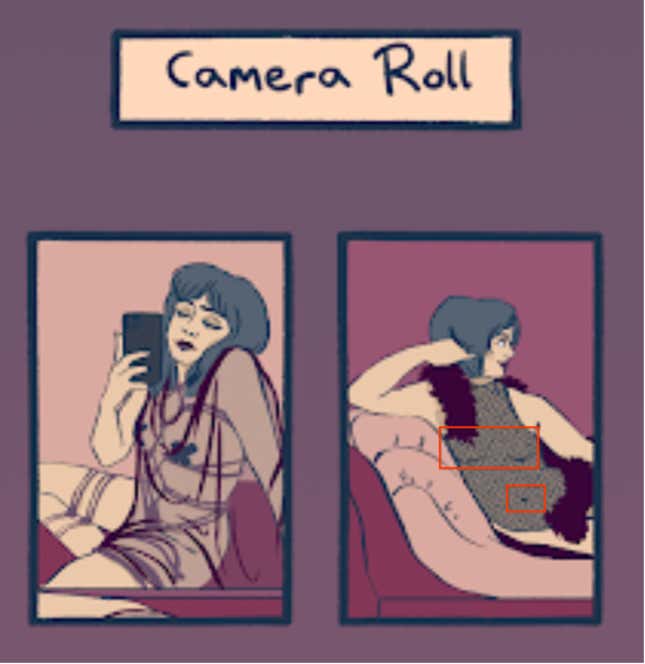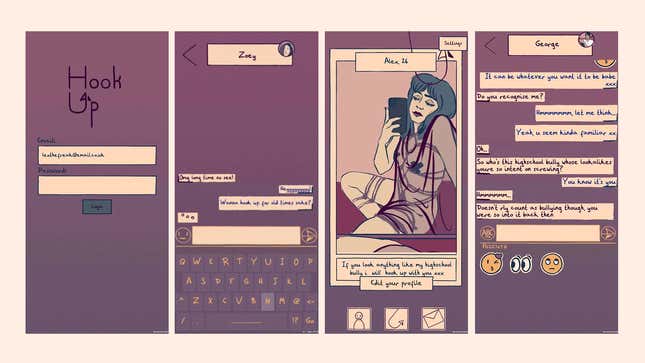
Just a few weeks after Hook Up: The Game released on Android, developer Sophie Artemigi was surprised to see the visual novel flagged for inappropriate sexual content.
By the game’s own description, you play as Alex, “a sex positive twenty-something” who matches with her old high school bully on a dating app, so of course, sexual themes are part of the package. But inappropriate? That was unexpected.
Google Play does warn developers that content designed to be “sexually gratifying” is not allowed on the platform, but it can be tricky to know how exactly that’s being enforced. Take 7 Sexy Sins, for example, a game which has the player removing the armor from anime demon girls, only to “snap some pictures… for personal uses”. It’s got an age rating of 12+ and has been downloaded more than 10,000 times without being pulled from the platform.
By contrast, Hook Up: The Game is a narrative game about dating, relationships and learning to deal with past trauma.
Artemigi appealed the decision to find out exactly what had crossed the line in this case.
In response she was told that Google “don’t allow apps that contain or promote sexual content or profanity”, or “appear to promote a sexual act in exchange for compensation”.
“For example”, the response continued, “your app screenshots currently contain an image that depicts sexually suggestive poses and sexual nudity”.
The following image was included as proof, with red rectangles drawn over the offending content.

You’ll note that the character’s breasts have been highlighted, but so has her belly button, which is just totally bizarre. Accordingly, Artemigi emailed back with her counterarguments.
First of all, Hook Up has nothing to do with sexual acts being performed in “exchange for compensation”, she explained. In an email shown to Kotaku, Artemigi asked why Google was conflating provocatively dressed women with sex workers?
As for the image itself, Artemigi argued that it’s meant to be reflective of the kind of pictures you might find on a dating app, which typically do not allow for pictures that are too revealing. It’s worth clarifying that Alex is not nude in this screenshot, but even if she was, the Play Store’s own policy states that nudity “may be allowed if the primary purpose is educational, documentary, scientific or artistic, and is not gratuitous”.
The illustration, Artemigi pointed out, was a direct reference to the statue of Napoleon’s sister and imperial princess, Pauline Boneparte, which you can see for yourself in Rome’s Galleria Borghese. It’s also pictured at the top of this article.
“That pose was specifically based on classical statues because there’s a reference to Alex feeling like her bully was this Greek god,” said Artemigi. “It’s meant to be about objectifying yourself and finding beauty in one’s self.”
But hey, sex is complicated and so, perhaps, are belly buttons.
After receiving another short reply stating that the screenshot depicts a “sexually nude and gratifying pose of a woman presented in a non-artistic way”, Artemigi asked to escalate the issue to somebody higher up in the policy team in the hopes of speaking to somebody who might appreciate the nuance of the situation.
The final response from her official Google contact once again pointed out that Hook Up was in violation of the platform’s policy, but this time ended with the following sentence:
“Regarding your concern about escalation, I am the highest form of escalation. Next to me is God. Do you wanna see God?”
Yikes.
“It was almost nice though,” said Artemigi, “because it kind of confirmed the vibe I’d been getting. I felt very dismissed, talked down to. At least they were honest in that one email, I’ll give them that.”
When asked for comment, Google told Kotaku that the person who wrote this email has now been removed from the developer support team.
Hook Up: The Game is still available to purchase on the Play Store, although it seemingly remains in breach of the company’s policy, meaning that Artemigi hasn’t been able to publish updates as she usually would.
It’s unclear whether this will have also affected the game’s standing on the platform, but it’s worth noting that despite hundreds of downloads and almost 40 reviews, searching “Hook Up: The Game” on the Play Store doesn’t bring up the game in my search results. Like, at all.
In fact, the only way I was able to find it via search was to use the full name of the developer.
There’s been no such problems over on iOS, although different screenshots are being used to market the game for that platform.

Some might argue that it’d be easier to just remove the screenshot altogether and see if Google is happy enough with that, but for Artemigi, this whole saga has highlighted some interesting questions about what kind of content game platforms deem to be acceptable.
“It’s a very queer, sex positive game,” said Artemigi. “It talks about sex tangentially. You don’t sext anyone, but it does deal with sexual themes. But it has a 16 rating, which is very appropriate for that. The idea that you can play GTA: San Andreas, which has prostitutes and sex workers, but god forbid you show a belly button in a game about a woman who likes sex and wants to be comfortable with her sexuality, is really frustrating.”
And that’s not to mention the work involved in creating the game either, only to end up exchanging emails with a support team that seems, at best, completely uninterested in guiding her through a stressful process.
Along with a small team of other developers, Artemigi has spent well over a year on this project, before finally publishing it back in June.
“Hook Up was done as part of my Masters at the National Film & Television School,” said Artemigi, “which has the unfortunate acronym of the NFTS.”
After completing her university degree, she then spent months ensuring the game was playable on different phones, playtesting and preparing for release day.
“But in that time, I had chemotherapy and was in isolation for five months. I also had an operation removing two of my internal organs a few weeks before. It wasn’t a full production period, it was me working whenever I could.”
Arthemigi has a very rare autoimmune disease called Evans syndrome, which means her immune system attacks her own red blood cells and platelets. She’s often hospitalized as a result, as was the case earlier this year.
“I’ve managed to do all of my education, get a masters degree and release a game, without missing a single year,” said Artemigi. “It’s very liveable, but it’s not easy. It’s definitely a disability. It definitely does impact my daily life and how I make choices.”

Despite the frustration she’s feeling, Artemigi is still thinking about the next game she wants to develop too. This project will also challenge platform policy, she thinks, but this time it’s focusing on violence, not sex.
“It’s ridiculous that if you look at the store policies for violence, you’ll get an entire page,” said Artemigi, “whereas for sex it’s more like one line that says don’t be pornographic and we’re not going to tell you what pornographic means. I’m still going to get in trouble with them, but sex specifically is something that I’m going to be very cautious about.”
Chris is a reporter at People Make Games.